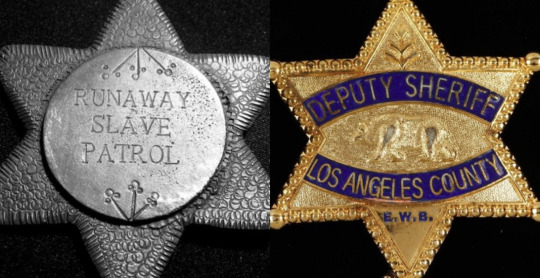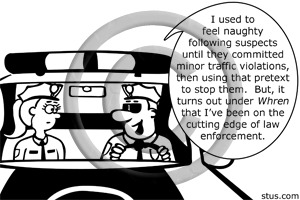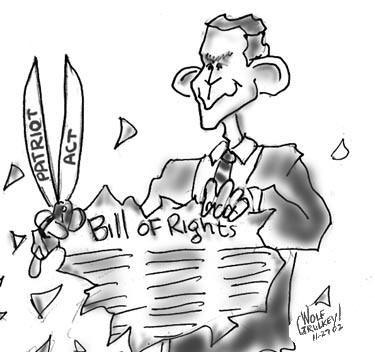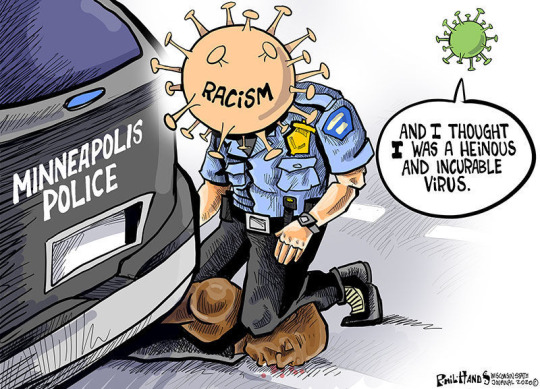Text
Racial Profiling: The Overwhelming Evidence
Racial profiling is so abundant in American societies that it somehow become a controversial topic. The disproportionate number of black people pulled over to their white counterparts has seeped into the excuse of coincidence and found its way to the presidential level. Yet racial profiling is not limited to traffic stops. In America, racial profiling can be seen in its historical roots, trafficking tactics, lifestyle after 9/11, and in its illegal immigration policies. In addition to this, racial profiling goes beyond various police departments. Other profiling behaviors are created such as profiling by proxy and linguistic profiling. Therefore, the evidence provides an overwhelming amount of truth when considering the existence of racial profiling.
History of Policing
The history of policing consists of two narratives, the North and the South. No matter the narrative, a similar point is proven. Regardless, the difference is still important and worth distinction. The Southern narrative focuses on the Southern Slave Patrols. The first slave patrols were found in South Carolina during the early 1700’s. Consisting of white people, their goal was to enforce laws related to slavery. The laws included the returning of enslaved people, dismantlement of uprisings held by enslaved people, and punishing a violation of plantation rules. Slave patrols were permitted to forcefully enter anyone’s home based on the suspicions of harboring escaped slaves.
When John Adams entered presidency in 1779, any state that had not abolished slavery had slave patrols. It was not until the end of the Civil War in 1885 that they fully disbanded. However, with the disbandment came the creation of other groups focused on the oppression of black people like the Klu Klux Klan. This is because breaking the patrols apart forced members to recategorize into new hate groups.

Notice the similarities between the earlier badges and police badges you see now.
The more favorable perspective is that of the North. This narrative suggests that the North had the first centralized municipal police departments during the early 19th century. The first was in Boston and new police departments formed in Albany, Chicago, New York, and Philadelphia. All of these departments, like the slave patrols, consisted of an overwhelming number of white males. Their goals were focused on disorder rather than crime and to control a “dangerous underclass.” This underclass was composed of African Americans, Immigrants, and poor people. With few standards and little training, this provided the opportunity of oppression among selected populations.
Both Southern Slave Patrols and Northern Police Departments have a common goal, control. This control feeds their superiority complexes and creates the separation of “us and them.” The history of policing is so important because it proves that policing is rooted in racism. Therefore it is reasonable to conclude that its modern concepts are a product of racism. These concepts further prove the existence of racial profiling.
Racial Profiling and The Highway

The most overwhelming support for racial profiling is found on the highway. In 1986, the DEA trained police in profiling. After they were trained, they were expected to teach others in their own departments. This was called Operation Pipeline. Although the DEA denies racial or ethnic appearance as a factor, the adaption of Pipeline tactics encouraged the systemic and increasingly common use of racial profiling. Police were targeting minorities on a more frequent basis.
Such frequency can be seen in New Jersey and Maryland. When both states adopted the guidelines provided by Operation Pipeline, there was a spike in racially motivated stops. In New Jersey, black people consisted of 13.5% of drivers in the road but accounted for 35% of traffic stops. More jarring statistics were produced by Maryland, who had 17% of black drivers on their roads accounting for 72% of traffic stops (Harris).
The goal of the traffic stops was to have a successful “hit rate.” A “hit” is when a police officer makes a successful traffic stop finding drugs or guns. Police targeted black and Hispanic populations in an attempt to make this hit rate higher. However, police “hit” more frequently when searching white people opposed to minorities. Racial targeting made hit rates worse, therefore it is non beneficial and redundant.
Another reason why Operation Pipeline is problematic is because it challenges the fourth amendment, which protects citizens from unreasonable search and seizure. In addition to pulling people over on minor traffic violations, police also used this as a pretext to investigate other crimes when they do not have any immediate evidence. Ultimately, the courts determined that this was within bounds of a permitted search and seizure practice.
An example of this can be seen in Whren v. United States. Police officers who were on duty for drug enforcement and not traffic patrol, saw two young African American men driving a late model sports car. These two young men were abiding traffic laws and police had no reason to suspect them, or their vehicle, with the involvement of a crime. Nonetheless, police followed the car and pulled them over on a minor traffic offense. Once pulled over, they observed cocaine in the car and both people in the car were arrested and eventually convicted on drug charges.
When this case was brought to the Supreme Court, defendants argued that this was a violation of their clients Fourth Amendment rights. This is because police used a minor traffic violation as a pretext to search the vehicle to convict the men on another offense. The Supreme Court challenged this and sided with police officers. Since an actual traffic violation was witnessed, it gave them probable cause to stop the vehicle. Whether their cause was racially motivated or not did not seem to matter. The backing of the Supreme Court created yet another opportunity for the abuse of power.

Post 9/11: A New Wave of Terrorists?
In 1999, 13 years after Operation Pipeline, 60% of Americans understood racial profiling and 81% disapproved of racial profiling as a police tactic (Harris). Yet a short two years later in a now post 9/11 world, Americans felt differently about “potential terrorists.” There was fear instilled in the American people. In fact there was a 2:1 margin believing the government should subject people of “Arab descent” to profiling in American airports (Harris).
This fear led to different policies allowing the government to be somewhat invasive towards Arab Americans. These policies included Special Registration and the USA Patriot Act. Special Registration required male foreign visitors in the U.S ages 16 and older to register to specified immigration offices. Over 60,000 men were fingerprinted, photographed and questioned by the authorities (Jachimowicz). The USA Patriot Act was similar in which it investigated Arab-Americans, except it was on a volunteer basis.

Profiling should not be racial, nor should it be used as an anti-terrorist tool. There are two dangers when using it as such. If agencies were to regularly target those who “look like terrorists” or Middle Eastern people, it would make a weak security system. Terrorist groups would easily be able to swap people who appeared Middle Eastern with people who looked more Western to obtain whatever goals they wish to achieve.
Regular use of profiling causes a large number of false positives, resulting in a lack of resources for real threats. It would also cause distrust of those being targeted. Arab Americans know their own culture and language better than most outsiders. A distrust from their community would prohibit them from becoming allies if it was ever necessary.
“Legal Status” AKA Another Reason to Profile
Racial profiling does not stop in black communities, nor does it stop in Arab communities. Racial profiling also effects Hispanic communities. In 1996, the federal government issued the Illegal Immigration Reform and Immigrant Responsibility Act. This was an effort to involve state and local police forces to become involved in immigration enforcement. State and local involvement was optional and on a volunteer basis. Only approximately 80 of 18,000 police departments made themselves available to the new task at hand (Harris). State governments instead made their own solutions to immigration issues.
A good representation of individualized state power with systemic racial motivations is Arizona. In response to the Illegal Immigration Reform and Immigrant Responsibility Act, Arizona created their “show me your papers” law. This law required officers conducting a detention of any kind to ask about the suspects immigration status. They had to do so anytime they had reasonable suspicion of an immigration issue.

The problem with the new legislature is that any lack of enforcement resulted in a penalty. Officers who did not carry out the legislature would subject either themselves or their department to a lawsuit. They had to adhere to the law or face legal issues. However, practicing the legislature would force police to make assumptions based on appearance or accents.
This is problematic especially in Arizona. Most residents in the state appeared Mexican. This is partly because Arizona was originally a part of Mexico, and was not an American state until the 20th century. Spanish is also widely spoken in Arizona. Consequently, the “show me your papers” law forced police to ethnically profile a state consisting of an entire different ethnic profile than most officers.

The evidence provided proves that police racially profile black, Hispanic, and Arab communities. It is reasonable to infer that they profile other communities as well. However, as much as police contribute to racial profiling, they are not the only ones to blame. Racial profiling is prevalent in society as a whole, not just among policing departments. Two examples of this are profiling by proxy and linguistic profiling.
White People Calling the Police (Repeatedly)
Profiling by Proxy is a new type of racial profiling. This is because it is dependent on cell phones and their ability to record at any time. Profiling by proxy is when white civilians see African Americans in places where the white civilians feel they do not belong. This results in white civilians calling police, using them as their proxy to investigate the behavior of “suspicious black people.”

For a comedic take on profiling by proxy, check out the following informercial.
An event displaying the use of Profiling by Proxy occurred May 2018 in Rialto, California. Four people, three of which were black, were checking out of an Airbnb rental. As they were loading their luggage in a car, seven police officers surrounded them. In addition to this, the men were told by the police sergeant that they were also being watched by a police helicopter. The police deemed the four men as suspects due to a call from a nearby white neighbor. The neighbor had said she did not recognize the men and there was reason to believe they were burglarizing the house.
The home in Rialto was not being burglarized. Four men were leaving the rental home. The group paid to stay there and yet , were under police suspicion for a crime that did not even happen. The sergeant did not know what an Airbnb was, therefore the group had to show paperwork permitting their stay. Officers had to contact the owner of the property and the guests waited 45 minutes before being released.
This moment is just a singular instance of profiling by proxy. The simple fact that this type of profiling is categorized separately from racial profiling proves both its existence and frequency. Profiling by proxy does not have to be carried out by the officers involved but almost always is. Due to the information received, police go into situations with a bias. Instead, they should make an independent assessment based on the complaint of the caller. Profiling by proxy is redundant and makes initial racial profiling tactics worse.
Linguistic Profiling, African American English, and George Zimmerman
Another product of racial profiling is linguistic profiling. Linguistic profiling is when a listener uses auditory cues to identify social characteristics. Such characteristics include, but are not limited to, race, gender, sexual orientation, or graphic origin. This in itself is not a discriminatory act, but using it for discriminatory purposes is. In contrast, racial profiling elies on all information, not just auditory cues, to create a profile. Although linguistic profiling is an automatic and neutral cognitive process of social organization, it still harms those who are profiled.
African American English (AAE) can be used to explain linguistic profiling. This dialect, despite common conceptions, has speakers from various social backgrounds. AAE is similar to formal English, but follows its own unique and strict set of rules. These rules are defined as formulas expressing patterns the dialect follows. The difference can be seen in various ways, one of which being in the syntax. In standard English, the verb “be” is used in the present tense to express a habitual action. Applying this formula produces the sentence, “Jill runs home everyday.” In AAE, the verb “be” is not conjugated. Instead the following verb is conjugated in the progressive form producing the sentence “Jill be running home everyday.”
The differences in AAE and formal English are because they are completely different dialects of the same language. This is not commonly understood so the dialect has been devalued. AAE is disregarded as “simplified” or “incorrect” English. Those who are discriminatory towards black people tend to label AAE as “ghetto” yet it is just a subcategory of English, with its own rules and limitations.
In The State of Florida v. George Zimmerman, linguistic profiling played a key role in the wrongful acquittal of George Zimmerman. Zimmerman was charged with the murder of 17 year old Trayvon Martin. This case swept the country as a case of unjust racial profiling. Trayvon was walking home with a hood over his head on the night of February 26, 2012. This made him “appear suspicious” ultimately ending in his unfortunate and tragic death.
An important witness in the case was Rachel Jeantel. Rachel was on the phone with Trayvon during the time of the incident. Considering the death of her friend, the only perspective thus far was that of Zimmerman. Her testimony provided insight as to what actually happened that night. By testifying, she was not only defending Trayvon but provided evidence that his murder was in fact racially motivated.

Rachel Jeantel during her testimony.
Despite her testimony which lasted over the course of two days, Zimmerman was found not guilty on all counts. The jury pool, who was all white, discredited her statement because they did not understand her use of AAE. A lawyer who observed Rachel’s testimony said that “her grammar and diction could be hard to interpret… in addition, Jeantel spoke using urban teenaged lingo that was an alien tongue to most of the white, suburban, middle-aged jurors” (Fiallo). Some of the lingo included her use of the word “nigga” in reference to any person, not just black people. As well as referring to Zimmerman as a “creepy-ass cracka” which offended the jury.
Juror B37 said that Jeantel was not even mentioned over the course of the jury deliberations. The all white jury profiled Rachel both linguistically and racially, therefore disregarding everything and anything she said. All preconceived assumptions made about here were then confirmed by how she spoke. If there was a black member in the jury, Zimmerman would have been found rightfully guilty. In fact, when there is an all white jury in Florida, they convict black defendants 16% more often than their white counterparts. This racial gap does not appear with the presence of a single black jury member. For this reason, representation matters. Representation has been the cause of various laws and theories that are intended to protect minority populations.
Critical Race Theory and a Racist Donald Trump
Critical race theory, for example, was created in the 1970s by a group of legal scholars and activists. Civil rights lawyer Derrick Bell, is credited as “the father of critical race theory.” The theory aimed to identify the important role of law in civil rights reform and in the creation of practices that excluded individuals. Essentially, theorists wanted to investigate the involvement of law in systemic racism. Their goals were to dismantle any practices that would further create disadvantages and privileges.
The modernized version of the theory is defined by the authors of Critical Race Theory: An Introduction as “a collection of activists and scholars interested in studying and transforming the relationship among race, racism, and power” (Lang). The theory aims to acknowledge white supremacy and its systemic effects in laws and other societal systems. Also, it accounts for other marginalized identities like sexual orientation, gender, sexuality, class, and disability.
In a societal setting, the theory examines the structure of institutional racism in various circumstances. Such circumstances include, but are not limited to access to education, housing segregation, bank lending, and discriminatory labor practices. Therefore, it can also be used to examine microaggressions, white privilege, etcetera. Discovering how structures of racism affect individuals allows for a more just worldly perspective. Therefore allowing a more inclusive law system.
The president does not seem to think so. In his speech at the National Archives Museum, Donald Trump said the use of the theory to consider U.S. history encourages “Deception, falsehoods, and lies” (Lang). Trump also seems to think that the theory is controlling. He said that young children are “complicit in oppression” and that critical race theory is being “forced into our children’s schools… workplace trainings, and it’s being deployed to rip apart friends, neighbors, and families” (Lang).

Trump's denouncement of critical race theory is disastrous for everyone involved. Disregarding America’s roots in white supremacy is ridiculous and foolish. There is so much evidence of white supremacy in this country it is absurd at this point to refute its existence. However, individuals defend white supremacy or similar ideologies in their day to day lives.
More of the Opposing Argument (Just Say You’re Racist and Go)

Marshall Frank, a former police captain from Miami, resembles those ideologies as well as the opposing argument to racial profiling at the individual level. In an opinion piece in the Miami Herald in October 19, 1999, he said to “label me a racist if you wish” (Harris). Frank continued to discuss the abundance of African Americans in prison as proof they commit more crimes. This must mean that racial profiling works. Marshal Frank is one of many dangerous perspectives against racial profiling. Yet, it all boils down to coincidence.
The most overwhelming opposing argument of racial profiling is the lousy excuse of coincidence. The disproportionate number of minorities pulled over is because they commit more crimes. Or racial disparities in crime rates are because the crimes originated in an area highly populated by one racial group. To those who do not believe in racial profiling, these correlations make sense. However they are not the slightest bit true.
Critics argue that hit rates are equal across racial groups, making the conclusion that minorities are searched within reason. Due to the equality across racial groups, police must be targeting dealers and not minorities. Officers have their own independent reasons to find someone suspicious, supported by knowledge of the race of major trafficking groups. Race is used more as a clue rather than a trafficking tactic.
Also, it has been argued that rewarding nature surrounding high hit rates causes more stops. Attorney General Verniero summarizes it well, “The state police reward system gave practical impetus to the use of these inappropriate stereotypes about drug dealers” (Donald). It was the system that integrated racially motivated stops for success, not the officers. Such racially motivated stops must be accurate otherwise police would follow new tactics.
Statistical studies in Maryland and New Jersey prove otherwise. They compared the stops and searches of blacks and Latinos, where race or ethnicity was used as a tactic to stops and searches of whites that were not racially motivated. Both states concluded that police hit more often when they searched white people opposed to blacks or Latinos. Testing this in two different states further supports this because the hit rates were consistent among the departments in different geographic areas with different missions.
Critics also point out supposed gaps in data. To accurately conclude that profiling does not exist there must be a benchmark created to measure if police are pulling over “too many” blacks and Hispanics. The benchmark would include information like the numbers of miles driven by different racial groups, age demographics, and the comparison of police deployment patterns with racial driving patterns.
If a supposed lack of data exists for the opposing side, it must too exist for the support. What, if any, is the relationship between racially motivated police stops and police stops not recorded? How many instances were not recorded both modernly and historically? Furthermore, how can you logically refute an argument by saying there is not enough evidence?
Overall, both the denouncement of the critical race theory and the belief of a false correlation regarding race and police cannot fully oppose racial profiling. Critical race theory aims to protect those who are targeted by racial profiling. To say in itself is racist is inaccurate. There is abundant evidence suggesting otherwise. Also, those who believe there is no correlation between race and police are simply ignorant.
Racial Profiling is Not Old News

Racial profiling is not a new concept because it has been noticed by the media. White people have been the oppressor since America’s beginnings with Native Americans. This is a white country with systemic holds on any and all minorities. History and modern events prove time and time again that minorities are not equal. Racial profiling ruins community and police relationships, does not make us safer, and harms people of color tremendously.
#endracialprofiling #opresstheoprresor
For more information regarding racial profiling:
Notes From the Field: A one man show provided by the talented Anna Devere Smith. She represents 18 different perspectives of those affected by bad policing.
Let it Fall: A documentary examining the relationship between LA’s black community and the police surrounding the times of the Rodney King riots.
_____________________________________________________
Works Cited
Donald, Heather Mac. “The Myth of Racial Profiling.” City Journal, Apr. 2001, www.city-journal.org/html/myth-racial-profiling-12022.html.
Elliott, Andrea. “After 9/11, Arab-Americans Fear Police Acts, Study Finds.” The New York Times, The New York Times, 12 June 2006, www.nytimes.com/2006/06/12/us/12arabs.html.
“Fourth Amendment.” Legal Information Institute, Legal Information Institute, www.law.cornell.edu/constitution/fourth_amendment.
Harris, David A. “Racial Profiling: Past, Present, and Future?” American Bar Association, 21 Jan. 2020, www.americanbar.org/groups/criminal_justice/publications/criminal-justice-magazine/2020/winter/racial-profiling-past-present-and-future/.
Hassett-Walker, Connie. “The Racist Roots of American Policing: From Slave Patrols to Traffic Stops.” The Conversation, 8 June 2020, theconversation.com/the-racist-roots-of-american-policing-from-slave-patrols-to-traffic-stops-112816.
Kocieniewski, David, and Robert Hanley. “An Inside Story Of Racial Bias And Denial; New Jersey Files Reveal Drama Behind Profiling.” The New York Times, The New York Times, 3 Dec. 2000, www.nytimes.com/2000/12/03/nyregion/inside-story-racial-bias-denial-new-jersey-files-reveal-drama-behind-profiling.html.
Lang, Cady. “President Trump Has Attacked Critical Race Theory. Here's What to Know About the Intellectual Movement.” Time, Time, 29 Sept. 2020, time.com/5891138/critical-race-theory-explained/.
McKay, Ramah, and Maia Jachimowicz. “'Special Registration' Program.” Migrationpolicy.org, 2 Mar. 2017, www.migrationpolicy.org/article/special-registration-program.
#racial profiling#racism#police#zimmerman#trayvonmartin#donald trump#criminology#acab#slave patrols#white people white peopling#white people
5 notes
·
View notes